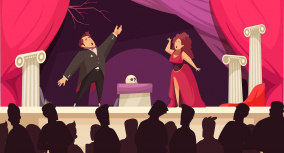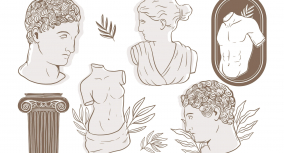There are multiple themes in The Odyssey, with the most prominent ones being loyalty, perseverance, and hospitality. Here’s how they’re reflected in Homer’s epic:
- Examples of loyalty in The Odyssey are abundant, especially in the actions of the protagonist, his crew, and his family in Ithaca.
- The theme of perseverance is also particularly evident through both Odysseus and his brilliant wife, Penelope.
- Hospitality is another significant theme of The Odyssey that has an interesting connection with the ancient Greek tradition of welcoming every guest with food and comfort.
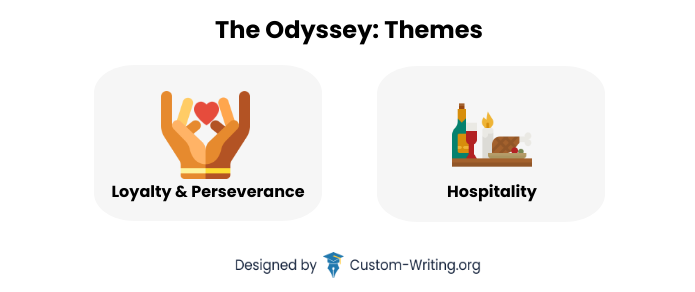
In Homer’s epic, these themes play a key role, contributing to the story’s lasting appeal. So, what is the theme of The Odyssey that had the most essential impact on its plot? Keep reading this article by our Custom-Writing.org experts to find out!
Loyalty & Perseverance
Loyalty and perseverance are the key themes of The Odyssey. Being multifaceted notions, they are represented in the epic from different perspectives. There is loyalty to family, friends, and gods.
Loyalty to family
Penelope is the brightest example of loyalty in The Odyssey. There was a considerable number of suitors at her home, forcing her to choose a new husband. However, she patiently waits for her husband and persistently rejects all the proposals to get remarried.
Telemachus is another loyal family member. Instead of taking his fathers’ throne, he stands for Odysseus against the suitors. Telemachus does his best to make his family reunited.
Odysseus himself is also one of the brightest loyalty and perseverance examples. At first sight, it might seem that he is not that faithful to his wife. Unlike Penelope, Odysseus doesn’t demonstrate his sexual fertility. However, he resists the temptation to marry Calypso, Circe, or Nausicaa. Thus, he rejects living his entire life in marvelous luxury. His heart belongs to Penelope, so he stubbornly overcomes all the obstacles and reaches home.
Overall, Penelope’s loyalty, Odysseus’ perseverance, and Telemachus’ faithfulness play a crucial role in the family reunion.
Loyalty to friends
Loyalty to friends is another point covered in The Odyssey. Homer provides a considerable number of examples when friends’ faithfulness determines the fate of Odysseus. For instance, the old nurse, Eurycleia, remains faithful to Penelope and her absent master. Also, Odysseus’ crew never leave him during their journey home. All of these factors significantly contribute to the main character’s success.
The key loyal figure is Odysseus’ dog Argos who waited for his master for 20 years. It was the first one who recognizes Odysseus disguised as a beggar. Unfortunately, the loyal dog dies. Therefore, Argos in The Odyssey is a symbol of danger that hangs upon Ithaca. Odysseus’ two decades of absence caused many troubles at home that lead to disastrous consequences. Thus, he should not waste his time and immediately impose order in Ithaca. The Odyssey proves that the loyalty of friends is a powerful tool for reaching the goal.
Loyalty to gods
Odysseus believes that his fate is in the gods’ hands. Thus, he is loyal to the Greek gods. The hero has an unusually profound connection with the goddess of wisdom, Athena. Being faithful to her, he receives Athena’s loyalty in return. She assists the main character throughout his entire journey and brings him home. Athena often asks his father, Zeus, for help. Here she risks a lot because angry at Odysseus Poseidon is Zeus’ brother. Still, Athena proves her dedication to Odysseus as a response to his faithfulness towards her.
There is a distinct tendency that can be inferred. Everyone loyal to another character somehow belongs to this person. Argos, for example, is Odysseus’ dog. In a way, Penelope and Telemachus belong to him.
The relationships between the gods and the people are very similar. People have to obey and stay faithful to the chosen divine figures. In return, the gods are supposed to support their followers and give them blessings.
Quotes
I am Odysseus, son of Laertes, known to the world
The Odyssey, Odysseus, Book IX
for every kind of craft—my fame has reached the skies.
Sunny Ithaca is my home.
[…]
Mine is a rugged land but good for raising sons—
and I myself, I know no sweeter sight on earth
than a man’s own native country.
“Ah great goddess,”
The Odyssey, Odysseus, Book V
worldly Odysseus answered, “don’t be angry with me,
please. All that you say is true, how well I know.
Look at my wise Penelope. She falls far short of you,
your beauty, stature. She is mortal after all
and you, you never age or die …
Nevertheless I long—I pine, all my days—
to travel home and see the dawn of my return.”
“Happy Odysseus!”
The Odyssey, Agamemnon’s ghost, Book XXIV
Agamemnon’s ghost cried out. “Son of old Laertes—
mastermind—what a fine, faithful wife you won!
What good sense resided in your Penelope—
how well Icarius’ daughter remembered you,
Odysseus, the man she married once!
The fame of her great virtue will never die.
The immortal gods will lift a song for all mankind,
a glorious song in praise of self-possessed Penelope.”
All is now made good, my heart’s desire,
The Odyssey, Odysseus, Book XIII
your convoy home, your precious, loving gifts,
and may the gods of Olympus bless them for me!
May I find an unswerving wife when I reach home,
and loved ones hale, unharmed! And you, my friends
remaining here in your kingdom now, may you delight
in your loyal wives and children! May the gods
rain down all kinds of fortune on your lives,
misfortune never harbor in your homeland!
Astonished,
The Odyssey, Odysseus, Book X
she withdrew to her own room. She took to heart
the clear good sense in what her son had said.
Climbing up to the lofty chamber with her women,
she fell to weeping for Odysseus, her beloved husband,
till watchful Athena sealed her eyes with welcome sleep.
Hospitality
One of the central topics of The Odyssey is Greek hospitality. While reading the poem, modern readers are often astonished by some paradoxical things. For example, why some of Odysseus’ enemies welcome him warmly at their places? Or why can’t Penelope kick the annoying suitors out? And why Telemachus is forced to endure mayhem the mother’s admirers cause in their house?
Turns out that the ancient Greek world was following the strict rules of hospitality. Greek mythology even has a specific term to determine this aspect of the culture – xenia. In The Odyssey, every household adheres to the principle of xenia. The ancient Greek civilization expected the hosts to provide guests with food, drinks, accommodation, and assistance.
One of the brightest examples of hospitality in The Odyssey is Odysseus’ household. While the King of Ithaca is absent, Penelope’s suitors fill the house. They act immorally and destroy Odysseus’ property. These people don’t hesitate to eat and drink all the food and beverages. Nevertheless, neither Penelope nor Telemachus don’t dare to kick the annoying and rude guests out. They are not willing to destroy the Ithaca’s long-standing tradition of hospitality.
Another case that focuses on hospitality in The Odyssey is the way Telemachus greets Athena who is disguised as Mentor. He doesn’t know who the stranger is, where he is from, and what he wants. Nevertheless, Telemachus invites him into the house and offers food and drinks. Only after a warm welcome, he establishes the stranger’s identity.
Besides Odysseus’ household, Circe also follows the rules of xenia. The nymph turns out to be an incredibly welcoming host. She treats Odysseus honorably and surrounds him with luxury. Moreover, she is a great assistant to the traveler. She’s the one who helps Odysseus to overcome the obstacles of the Sirens, Scylla, and Charybdis.
The Phaeacians with Princess Nausicaa, King Alcinous, and Queen Arete are hospitable people as well. Being excited about Odysseus’ military achievements, they listen to his stories with much excitement. They provide him with food, shelter, gifts, and help him reach the city of Scheria.
However, not all the characters of the poem are faithful to ancient Greek traditions. Here are some of them who disobey xenia. One such example the readers find in The Odyssey is the Cyclops. Instead of welcoming the strangers, the one-eyed giants act rudely and immorally. They cause a lot of danger to travelers. The beautiful creatures from the Greek myths, Sirens, behave similarly. They pretend to be lovely ladies singing their bewitching song. But in fact, they attract travelers to kill them.
Overall, the ancient Greek traditions of hospitality take an essential place in The Odyssey. Homer proves that it may become an inevitable factor for somebody’s fate.
Quotes
First by far to see her was Prince Telemachus,
The Odyssey, Narrator, Book I
sitting among the suitors, heart obsessed with grief.
[…]
Daydreaming so as he sat among the suitors,
he glimpsed Athena now
and straight to the porch he went, mortified
that a guest might still be standing at the doors.
Pausing beside her there, he clasped her right hand
and relieving her at once of her long bronze spear,
met her with winged words: “Greetings, stranger!
Here in our house you’ll find a royal welcome.
Have supper first, then tell us what you need.”
She called out to her girls with lovely braids:
The Odyssey, Nausicaa, Book VI
“Stop, my friends! Why run when you see a man?
Surely you don’t think him an enemy, do you?
There’s no one alive, there never will be one,
who’d reach Phaeacian soil and lay it waste.
[…]
So, quick, my girls,
give our newfound friend some food and drink
and bathe the man in the river,
wherever you find some shelter from the wind.”
Straightaway
The Odyssey, Odysseus, Book X
she began to swear the oath that I required—never,
she’d never do me harm—and when she’d finished,
then, at last, I mounted Circe’s gorgeous bed …
At the same time her handmaids bustled through the halls.
[…]
One draped the chairs with fine crimson covers
over the seats she’d spread with linen cloths below.
A second drew up silver tables before the chairs
and laid out golden trays to hold the bread.
A third mulled heady, heart-warming wine
in a silver bowl and set out golden cups.
A fourth brought water and lit a blazing fire
beneath a massive cauldron.
[…]
The bathing finished, rubbing me sleek with oil,
throwing warm fleece and a shirt around my shoulders,
she led me in to sit on a silver-studded chair,
ornately carved, with a stool to rest my feet.
But lustrous Calypso shuddered at those words
The Odyssey, Calypso, Book V
and burst into a flight of indignation:
[…]
“There all the rest of his loyal shipmates died
but the wind drove him on, the current bore him here.
And I welcomed him warmly, cherished him, even vowed
to make the man immortal, ageless, all his days …”
But now the suitors trooped in with all their swagger
The Odyssey, Narrator, Book I
and took their seats on low and high-backed chairs.
Heralds poured water over their hands for rinsing,
serving maids brought bread heaped high in trays
and the young men brimmed the mixing-bowls with wine.
They reached out for the good things that lay at hand,
and when they’d put aside desire for food and drink
the suitors set their minds on other pleasures,
song and dancing, all that crowns a feast.


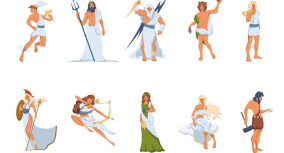
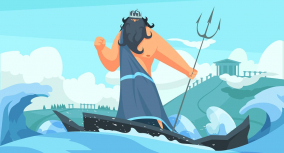



![Hamlet Themes: Death, Revenge, & Others [With Quotes]](https://custom-writing.org/blog/wp-content/uploads/2021/02/Themes-284x153.jpg)

